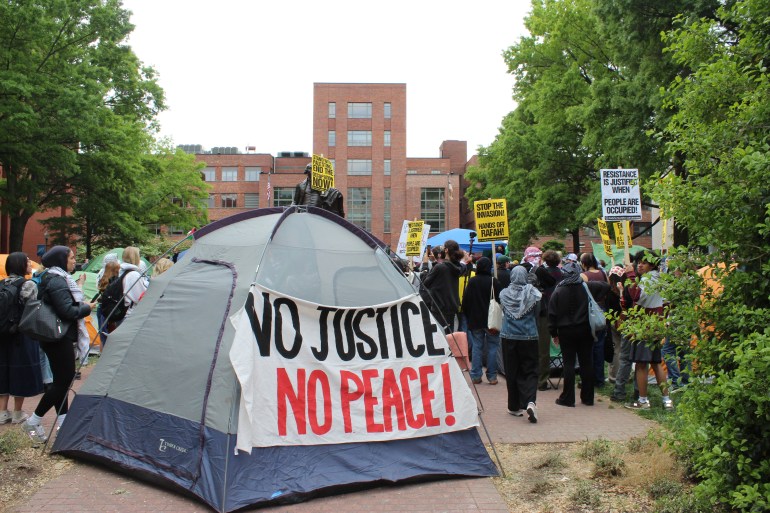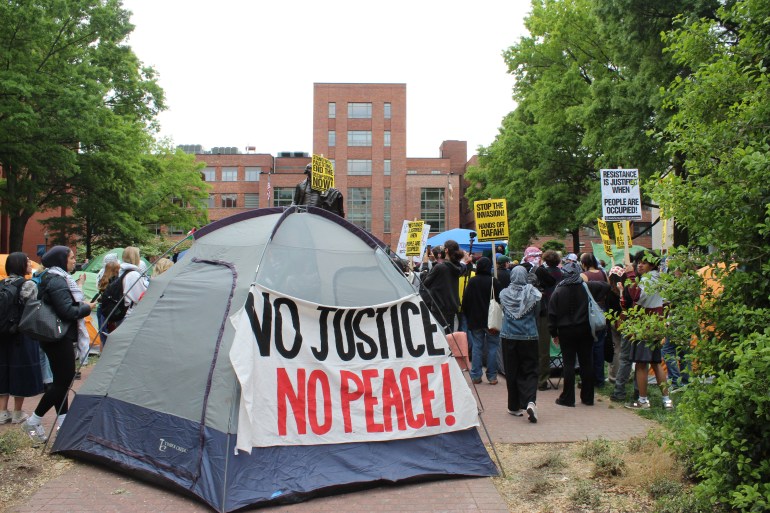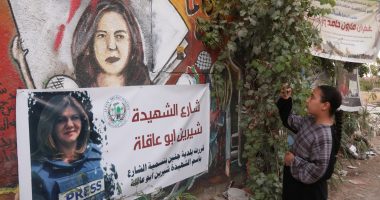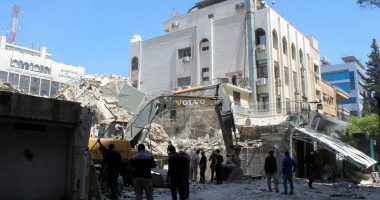Washington, DC – Chants of “free Palestine” were interrupted by ululating and cheers as dozens of Georgetown University students arrived at a protest at the neighbouring George Washington University (GW) campus in the heart of the US capital city.
Students, professors and activists from across the Washington, DC, area gathered on Thursday to show solidarity with Palestinians amid the war on Gaza and demand an end to what they call their colleges’ complicity in Israel’s human rights abuses.
Students at GW had set up a protest encampment on campus, joining the pro-Palestinian demonstrations sweeping colleges across the country.
“We’re here to show support for the students at GW and also to raise the demands of all the students in DC, which are to divest from companies that are involved in weapons manufacturing and Israeli apartheid, and to cut ties with Israeli universities because of their complicity in the Israeli genocide in Palestine,” Anna Wessels, a Georgetown student, told Al Jazeera.
The GW encampment brought college protests that have gripped the country to a campus that is blocks away from the White House and the Department of State.
Wessels stressed the significance of the protests taking place in the seat of the federal US government, where President Joe Biden approved $26bn in aid to Israel days ago.
“If we weren’t doing anything in DC, then we’re not living up to our moral responsibility,” Wessels said.
‘This is about Gaza’
Several students and organisers told Al Jazeera on Thursday that they remained focused on Gaza and Palestine, where the Israeli military has killed more than 34,000 people, and mass graves continue to be discovered.
“This entire encampment was made with every single messaging to be around the genocide in Gaza and to revolve around centring all of the demands on Gaza,” said Mimi Ziad, an activist with the Palestinian Youth Movement.
“This isn’t about the students. This is about Gaza. This is about all of Palestine.”
Students draped in keffiyehs had congregated on a GW grass lawn dotted with tents around a statue of George Washington, the first American president.
“George Washington says free Palestine,” read a paper sign that was taped to the statue.
The protesters raised their voices in unison to the beats of a drum in support of Palestinians, condemning Israel for its violations.
“The students, united, will never be defeated,” they chanted, as Palestinian flags waved alongside signs calling for a permanent ceasefire in Gaza.
Student organisers, sporting yellow and pink vests, directed foot traffic within the demonstration and handed bottles of water to people.
“It feels great to be around other people who see the reality we see and who share the outrage and frustration and also share the energy to solve the problem,” said Elliott Colla, a Georgetown faculty member who joined the protest at GW.
Several demonstrators said pushing universities to divest from Israel can have a tangible effect on the conflict, as boycotts of South Africa helped end the apartheid system in the early 1990s.
College activism around Gaza has taken centre stage in US politics in recent days.
A Palestine solidarity encampment at Columbia University in New York faced a police crackdown and arrests last week as the college administration called on law enforcement to clear the protest. The university has now set a Friday deadline for the protest to disband.
But students continued to demonstrate. Their campaign spread to other colleges across the country, including the University of Texas at Austin (UT Austin), Boston’s Emerson College, Georgia’s Emory University and the University of Southern California (USC), with dozens of students also arrested at the institutions.

Anti-Semitism accusations
Pro-Israel politicians from both major parties have been condemning the protesters and accusing them of anti-Semitism – a charge that Palestinian rights activists reject.
On Wednesday, House Speaker Mike Johnson visited the Columbia campus and accused the protesters of intimidating and threatening Jewish students. He also suggested withholding funding to universities that allow pro-Palestinian protests.
“If these campuses cannot get control of this problem, they do not deserve taxpayer dollars,” Johnson, who was met with “Mike, you suck!” chants, said.
But student protesters across the country have condemned anti-Semitism, noting that many of the demonstrators are themselves Jewish. Donia, a protester at GW, said such accusations of anti-Semitism are hurting the fight against bigotry.
“When you’re accusing anyone who’s against genocide in Gaza of being anti-Semitic, you’re losing the actual meaning of the movement against anti-Semitism,” Donia, who chose to be identified by her first name only out of fear of reprisal, told Al Jazeera.
She added that pro-Israel advocates were “freaking out” and trying to repress the student movement with anti-Semitism allegations because they know it is effective.
“A lot of the future generation of politicians in this country are at these universities, and they’re not buying their lies any more. That’s what’s really scaring them,” Donia said.
Israeli Prime Minister Benjamin Netanyahu weighed on the protests on Wednesday, calling them horrific. “Anti-Semitic mobs have taken over leading universities,” he said.
His remarks prompted a rebuke from progressive US Senator Bernie Sanders, who is Jewish.
“No, Mr Netanyahu. It is not anti-Semitic or pro-Hamas to point out that in a little over six months your extremist government has killed 34,000 Palestinians and wounded more than 77,000 – 70 percent of whom are women and children,” Sanders said in a statement on Thursday.
‘How can I be afraid?’
Zaid Abu-Abbas, an 18-year-old GW student, said the protesters are simply calling for the rights of Palestinians to be protected, dismissing accusations of anti-Semitism as bogus.
He said he was encouraged by the turnout at the protest, expressing hope that the student-led demonstrations can bring about change beyond campus.
“We are in DC near all these government buildings and politicians; they have no other choice but to see what we’re doing,” Abu-Abbas told Al Jazeera.
The joyous atmosphere at GW on Thursday drew a stark contrast with footage of violent arrests at other campuses.
However, students interviewed by Al Jazeera played down the prospect of a law enforcement push to clear the encampment.
Ziad, the Palestinian Youth Movement activist, said she is worried about the students, but she herself is not scared. “How can I be afraid if I’m Palestinian?”
Read More: World News | Entertainment News | Celeb News
Aljazera










